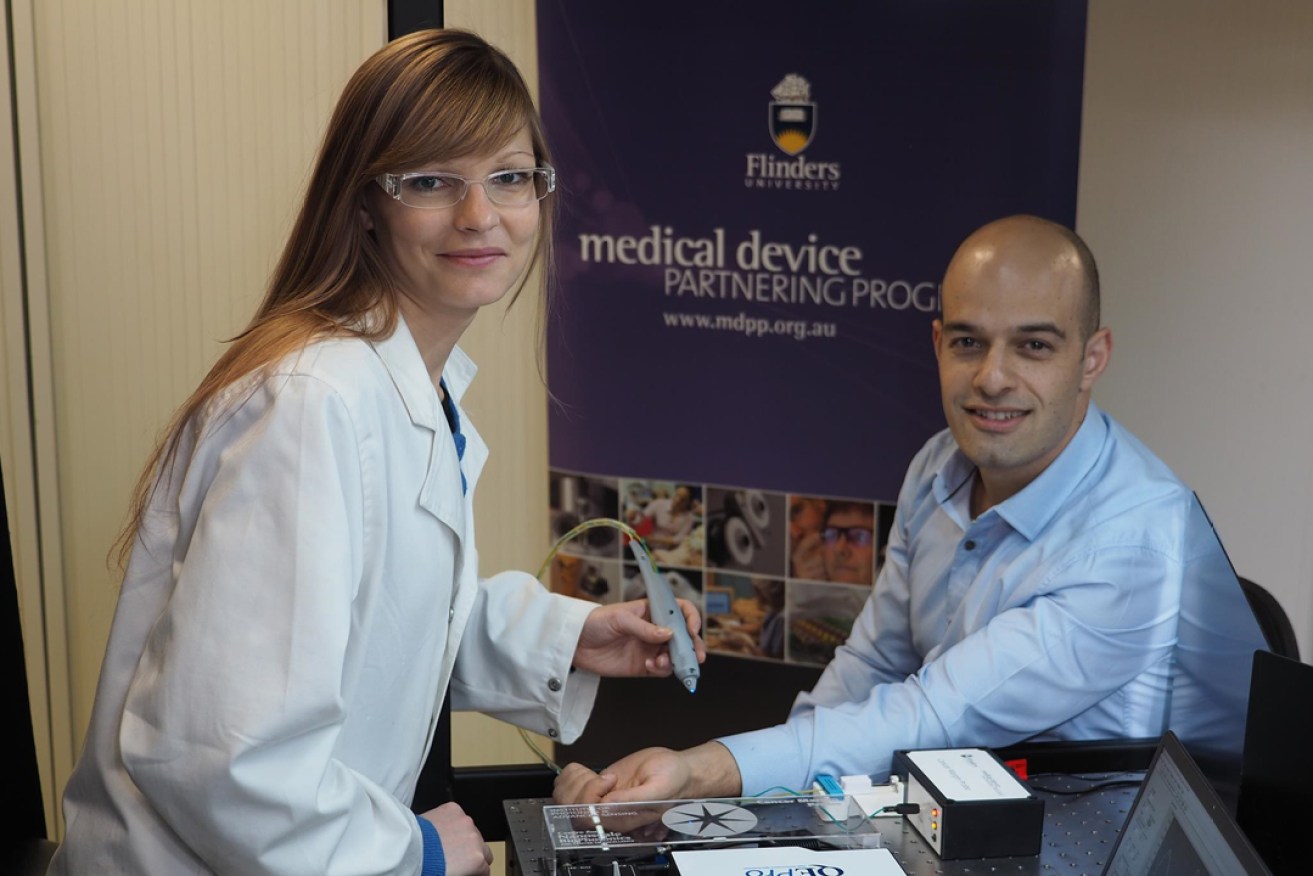Cancer detecting probe to transform surgical outcomes
A cancer detecting probe that can improve clinical outcomes for patients is being brought to clinical trials with assistance from Flinders biomedical engineers and State Government funding.

Flinders University researcher Dr Aaron Mohtar with Dr Elizaveta Klantsataya from The University of Adelaide.
The device – an optical fibre probe that identifies cancerous tissue in real time by measuring pH levels of tissue – helps surgeons precisely remove cancerous tissue while sparing the healthy tissue surrounding it.
A major improvement on current methods, which rely on lab testing of tissue after surgery, it is expected to also improve aesthetic outcomes for patients while significantly reducing revision surgeries.
The State Government funding, from the Medical Technologies Program,enabled Dr Erik Schartner and Professor Mark Hutchinson from the University of Adelaide’s ARC Centre of Excellence for Nanoscale BioPhotonics to work with biomedical engineers from Flinders University’s Medical Device Partnering Program (MDPP).
The MDPP connects medical innovators with leading biomedical engineers, providing them with 250 hours of research and development assistance, as well as market intelligence to take innovations from the laboratory to hospitals and homes, creating opportunities for local manufacturers.
Health Industries Minister Jack Snelling said the probe was an outstanding outcome born of the first collaboration between the Medical Device Partnering Program and the Australian Research Council Centre of Excellence for Nanoscale BioPhotonics – both funded in part by the State Government.
“The project is a great example of an innovative collaboration, which is what we do so brilliantly in South Australia,” Mr Snelling said.
“We are big enough to have world-class talent, but small and agile enough that we can work together to get things done.”
MDPP Director and Flinders University Professor and Karen Reynolds said she believed in the benefits of connecting people, and giving inventors assistance early in the process.
“That’s why we established the MDPP in the first place, and that is why it has been so successful,” she said. “This project really shows what we are about – combining engineering, clinical and business expertise at the crucial moment to transform great ideas into real-world devices that change lives.”
The Director of the University of Adelaide ARC Centre of Excellence for Nanoscale BioPhotonics, Professor Mark Hutchinson, said the project was truly multidisciplinary and had “drawn in physicists, doctors, mathematicians, biomedical engineers and more”.
University of Adelaide postdoctoral researcher Dr Erik Schartner said the pH level of tissue gives a really good indication of whether or not tissue is healthy or cancerous.
“The probe works by looking at the pH of tissue – whether it’s acidic or alkaline,” said Dr Schartner. “It has an optical fibre fluorescent sensor at the tip, which samples an area only 200 microns in diameter (0.2 mm), with the probe responding in approximately 10 seconds.
“This is a significant improvement on current methods.
“We have done a lot of lab-based testing, but we were missing a prototype to demonstrate how the probe would function in an operating theatre. That is where the MDPP came in and we were very happy with their work.”
The State Government’s Medical Technologies Program, delivered through Flinders University’s Medical Device Partnering Program (MDPP), is an innovative model for collaboration between inventors, researchers, end-users and commercial partners.
For more information on the Medical Device Partnering Program, visit www.mdpp.org.au





